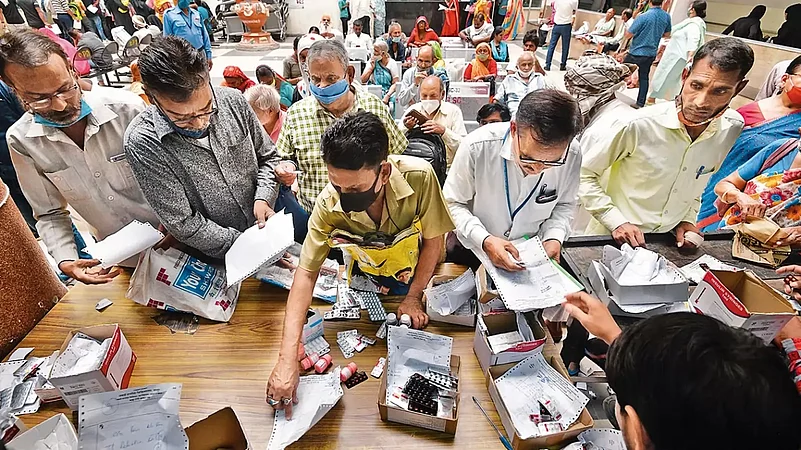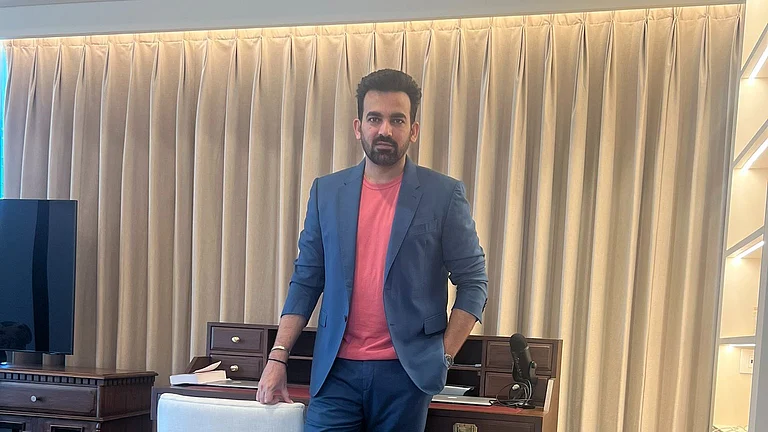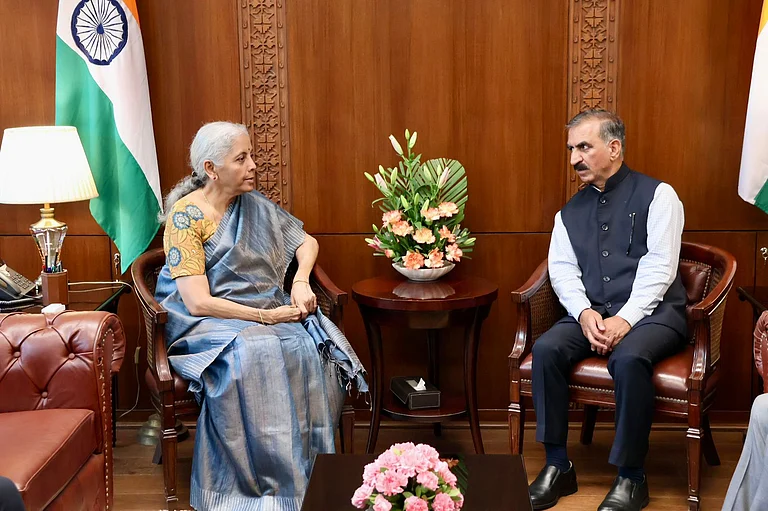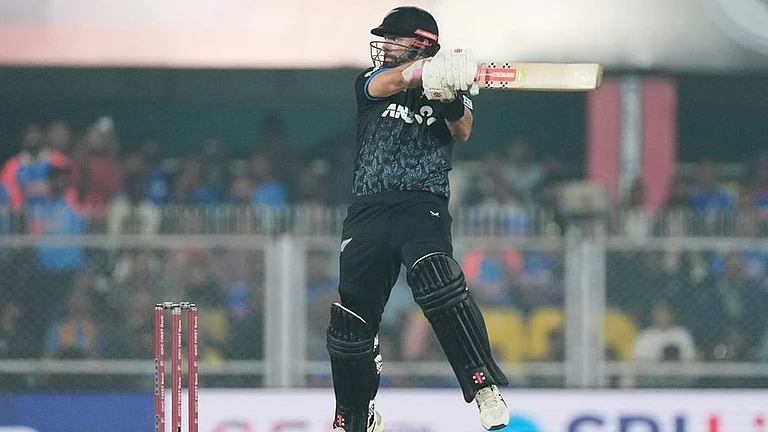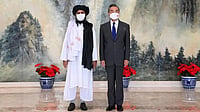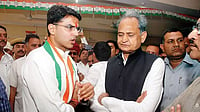In the intensive care unit ward at Jaipur’s Sawai Man Singh Hospital, Badri Prasad, a 40-year-old man is lying on a bed. He is diagnosed with cardiomyopathy, a disease of the heart muscle that makes it harder for the organ to pump blood. Prasad’s eyes are sunken, his face is pallid. Weakness has besieged his body and his cheekbones are prominently visible. One can count his ribs, protruding through his black t-shirt, as his bosom heaves and gasps for breath. With each breath, Prasad, an ailing tempo driver from Rajasthan’s Hanumangarh, is inching closer to death. In the ward, dimly lit with white, fluorescent overhead bulbs and smelling of disinfectants and phenyl, Prasad is fighting a battle against time. He is waiting for a new heart.
In the cardiology ward, adjacent to the critical care unit, dozens of patients lie with heart ailments. Most of them come, like Prasad, from impoverished backgrounds and cannot afford expensive treatment. A 16-month-old boy, Hemanth, from Karauli district, has a hole in one of the arteries near his heart. The surgery to fix the congenital disease would cost him around Rs 1 lakh. The child’s father is a mason, who hardly earns about Rs 15, 000 a month. Khamoshi, a woman in her 40s, is diagnosed with a similar ailment, and her surgery would cost around the same amount. Lakhs of people like Prasad, Hemanth and Khamoshi cannot afford such costly medical procedures. However, Rajasthan government’s health insurance scheme offers them hope.
The state government’s Mukhyamantri Chiranjeevi Swasthya Bima Yojana (MMCSBY), is a public health insurance scheme that provides cashless medical insurance of up to Rs 10 lakh to families in the state. The scheme, under which more than 1.33 crore families are registered, was launched in May 2021, and offers packages for organ transplants. The treatment under organ transplant packages is given beyond the basic coverage of Rs 10 lakh.
In India, piling medical bills and huge out-of-pocket expenditure push people into penury, and it gets worse for people living below the poverty line.
According to WHO reports, expensive medical treatment pushes almost 100 million people into poverty each year, with low-income nations being hit the hardest. According to estimates, there may be over 60 million people in India pushed into poverty owing to piling medical bills. The World Bank concluded in a recently published report that at least 5.6 crore Indians slipped into poverty in 2020 due to the pandemic.
An estimated 10 million Indians lost their jobs because of the second wave. According to a report by the Centre for Sustainable Employment at Azim Premji University, nearly 230 million individuals fell below the national minimum wage poverty line in India.
The rise in poverty, says a health policy expert based in Delhi, in turn, results in a drastic rise in the number of people falling sick, for several reasons, including access to affordable healthcare, proper nutrition, hygiene and cleanliness. In these circumstances, schemes like MMCSBY are empowering, chiefly because people’s incomes are not drained by huge out-of-pocket expenditure and partly because these schemes enhance accessibility to primary and tertiary healthcare that keeps the disease in check in the initial stages.
According to the National Family Health Survey 5 (2021), 88 per cent of households in Rajasthan have at least one member covered by a health scheme or health insurance. The Ministry of Health claims that nine out of ten people are covered under a health insurance scheme in the state.
Since MMCSBY was launched, many institutions are witnessing an overflow of patients. As people frequent government hospitals for free healthcare facilities, in huge numbers, the burden on staffers and security officers at times becomes unmanageable.
On an average weekday, Sawai Man Singh Hospital’s OPD caters to about 12,000 patients. Patients come along with attendants and the count surges up to around 35,000. There are 28 registration counters in the OPD, and usually 26 operate. Catering to such a huge load of patients overwhelms the staff.
Sampat Grassia, a 60-year-old man, spent nearly two-and-a-half hours at the SSM’Hospital’s senior citizens’ free drug distribution centre waiting for his turn. The reason is simple. The nurse at the distribution counter tells Outlook, “If we had extra pharmacists and nurses available, we could do our job quickly, but people have to wait for hours.”
Every day, 400 patients at the senior citizens’ counter are given medicines for free. The dearth of space and staff does not allow things to run smoothly. “Chiranjeevi is good, but what about the overwhelmed staff and the suffering patients?” a staffer at SMS Hospital asks.
Rajasthan also runs health schemes like Mukhyamantri Nishulk Janch Yojana (MNJY) and Mukhyamantri Nishulk Dava Yojna (MNDY) that provide an array of diagnostic facilities and essential medicines. Under MNJY, between April 2013 and June 2022, nearly 44.2 crore diagnostic tests were conducted free of cost and the total number of beneficiaries under the scheme is around 18.7 crore.
Under MNDY, the government has spent around Rs 1063.8 crore in 2021-22 compared to Rs 116.3 crore in 2011-12, when the scheme was launched. There are around 3837 drug distribution centres across the state that provide medicines free of cost.
The state government is aggressively trying to cover the health expenses of the population whether it is for out-patient or in-patient care. Moreover, the state government has come up with a scheme that gives financial aid to trangenders for gender change surgery. They will receive up to Rs 2.50 lakh for this surgery, along with the benefits of the MMCSBY.
Although the state government believes that it is doing well in the domain of healthcare, a health policy expert from the George Institute in Delhi quips, “The government is giving financial aid and ensuring cover for the people who are falling sick. But for the insurance scheme to run properly, without any bottlenecks, the authorities have to focus on how to stop more people from falling sick.” He further says that insurance schemes do not prevent people from falling sick, focusing on “preventive and promotive healthcare” will, adding, “Better hospitals, abundance of doctors and schemes should not be the sole focus of governments. They should also focus on better access to nutrition, food security and proper sanitation.”
Nevertheless, experts say that the most beneficial aspect of the MMCSBY is that it also caters to organ transplant patients, where the expenditure often goes beyond Rs 10 lakh. The scheme, many believe, offers hope to people like Prasad. The heart transplant surgery would otherwise cost him at least Rs 30 lakh, an amount the ordinary tempo driver could never afford.
(This appeared in the print edition as "Panaceas and Perils")






